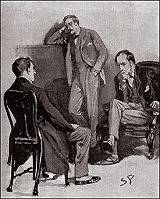THE PROBLEM
I CONFESS that at these words a shudder passed through me. There was a thrill in the doctor’s voice which showed that he was himself deeply moved by that which he told us. Holmes leaned forward in his excitement and his eyes had the hard, dry glitter which shot from them when he was keenly interested.

“You saw this?”
“As clearly as I see you.”
“And you said nothing?”
“What was the use?”
“How was it that no one else saw it?”
“The marks were some twenty yards from the body and no one gave them a thought. I don’t suppose I should have done so had I not known this legend.”
“There are many sheep-dogs on the moor?”
“No doubt, but this was no sheep-dog.”
“You say it was large?”
“Enormous.”
“But it had not approached the body?”
“No.”
“What sort of night was it?”
“Damp and raw.”
“But not actually raining?”
“No.”
“What is the alley like?”
“There are two lines of old yew hedge, twelve feet high and impenetrable. The walk in the centre is about eight feet across.”
“Is there anything between the hedges and the walk?”
“Yes, there is a strip of grass about six feet broad on either side.”
“I understand that the yew hedge is penetrated at one point by a gate?”
“Yes, the wicket-gate which leads on to the moor.”
“Is there any other opening?”
“None.”
“So that to reach the yew alley one either has to come down it from the house or else to enter it by the moor-gate?”
“There is an exit through a summer-house at the far end.”
“Had Sir Charles reached this?”
“No; he lay about fifty yards from it.”
“Now, tell me, Dr. Mortimer - and this is important - the marks which you saw were on the path and not on the grass?”
“No marks could show on the grass.”
“Were they on the same side of the path as the moor-gate?”
“Yes; they were on the edge of the path on the same side as the moor-gate.”
“You interest me exceedingly. Another point. Was the wicket-gate closed?”
“Closed and padlocked.”
“How high was it?”
“About four feet high.”
“Then anyone could have got over it?”
“Yes.”
“And what marks did you see by the wicket-gate?”
“None in particular.”
“Good heaven! Did no one examine?”
“Yes, I examined, myself.”
“And found nothing?”
“It was all very confused. Sir Charles had evidently stood there for five or ten minutes.”
“How do you know that?”
“Because the ash had twice dropped from his cigar.”
“Excellent! This is a colleague, Watson, after our own heart. But the marks?”
“He had left his own marks all over that small patch of gravel. I could discern no others.”
Sherlock Holmes struck his hand against his knee with an impatient gesture.
“If I had only been there!” he cried. “It is evidently a case of extraordinary interest, and one which presented immense opportunities to the scientific expert. That gravel page upon which I might have read so much has been long ere this smudged by the rain and defaced by the clogs of curious peasants. Oh, Dr. Mortimer, Dr. Mortimer, to think that you should not have called me in! You have indeed much to answer for.”
“I could not call you in, Mr. Holmes, without disclosing these facts to the world, and I have already given my reasons for not wishing to do so. Besides, besides- -”
“Why do you hesitate?”
“There is a realm in which the most acute and most experienced of detectives is helpless.”
“You mean that the thing is supernatural?”